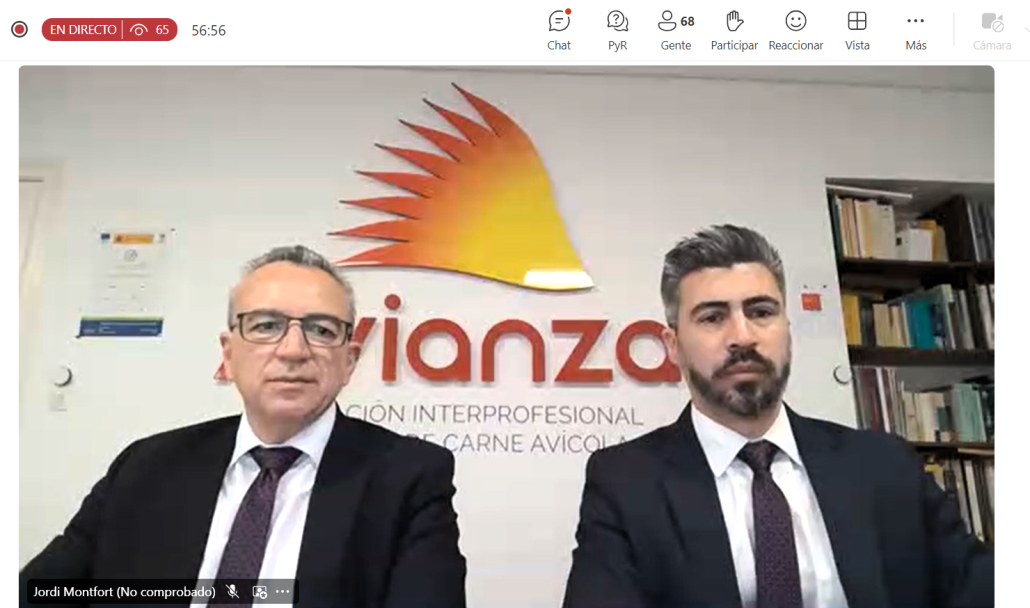Avianza has held a meeting with distribution, restaurant brands and the media where it has delved into the main challenges of the poultry sector in 2025
Poultry meat accounts for 411 TP3T of total protein consumption in Europe, consolidating its position as one of the main sources of protein in the European diet and global poultry meat consumption is expected to grow by 21 TP3T per capita by 2032.
Chicken meat is the most consumed fresh meat, with 557,900 tons in 2023
In terms of sustainability, European poultry meat is already established as a role model in the food sector and follows the objectives and meets the standards of the European Commission's Farm to Fork strategy.
Pressure from animal rights initiatives such as the European Chicken Commitment (ECC) to impose its model would entail an investment of 8.24 billion euros, which would reduce European production capacity and increase imports from countries with less strict regulations.
Madrid, February 4, 2025. Avianza, the Spanish Interprofessional Association of Poultry Meat, has held a debate forum for professionals in the sector, distribution and restaurant brands, as well as for specialized journalists. In this virtual meeting, Josep Solé and Jordi Montfort, president and general secretary of Avianza, respectively, together with Carlos Garcés, researcher and president of the European Federation of WPSA (World's Poultry Science Association) delved into the situation of the poultry sector for 2024 and the challenges for 2025.
European poultry meat, a sustainable food sector
European poultry meat accounts for 411 TP3T of total protein consumption in Europe, establishing itself as one of the main sources of protein in the European diet and global poultry meat consumption is expected to grow by 21 TP3T per capita by 2032.
But it is also recognised worldwide for its high quality and efficient use of resources. Producers in the sector are aware of the importance of sustainability throughout the production chain, following the objectives of the European Commission's Farm to Fork Strategy.
The European poultry sector is constantly seeking to improve its practices, establishing itself as a global model in food sustainability with strict EU regulations that guarantee resource conservation and animal welfare.
In Spain, chicken meat is the most consumed fresh meat, with 557,900 tonnes in 2023, which represents an increase of 15% compared to the previous year.
A sustainable sector that they try to pressure with hoaxes
Following these objective data on good practices in the European poultry sector, Avianza spokespeople wanted to delve deeper into the threats and the appearance of hoaxes and misinformation surrounding production systems and certifications promoted by animal rights groups and international pressure lobbies.
Specifically, in relation to the initiative called European Chicken Commitment (ECC), under a pressure campaign for adherence to its own seal of animal welfare, in Spain coordinated by the Animal Welfare Observatory, which requires producers to eliminate breeding systems to focus only on the most expensive segment of products, derived from opting for lower breeding densities, the use of slow-growing strains and breeding in facilities with access to the outside. These measures would be the death knell for thousands of farmers in Spain, as well as an increase in costs that will impact on the ability of consumers to choose more affordable poultry meat.
Its impact in logistical and economic terms is equally unaffordable (ADAS Report), something that animal rights organisations do not provide in a transparent manner to show the consequences of their demands. It is estimated that the implementation of the ECC would increase production costs by 21.9% per kg of poultry (from €2.74 to €3.34), an amount that could reach €22/kg in the case of breasts.
Furthermore, moving current production systems to ECC conditions would require 66.3% more farming space, which would be equivalent to the construction of around 9,692 new poultry houses, at an estimated cost of €8.24 billion. This scenario not only represents a huge financial effort for producers, but could also lead to a significant reduction in production in Europe, opening the door to greater dependence on imports from third countries, where regulations are much less strict.
“In addition to all these handicaps, there is the campaign of discredit and lies carried out by these organisations, providing supposed studies, clearly biased, with the sole aim of generating controversy and confusion among consumers and, ultimately, putting pressure on distribution companies, restaurant brands and poultry companies to join the private initiative of the ECC and continue financing these organisations” said Jordi Montfort, secretary of Avianza, adding that “what is really serious is that they call into question the advances of the sector in terms of sustainability and animal welfare, both European and Spanish, for a purely economic and ideological interest, and that they try to sell it to the consumer as an animalist act. The consumer deserves to have all the information”
For his part, researcher Carlos Garcés, reaffirmed, through studies and contrasted data, that “producing poultry meat is producing the most sustainable meat in the world, it is the meat that has the greatest efficiency as a product because the poultry sector is the sector that has opted for technological improvements.”
“Sustainable European Poultry Meat” Campaign
Avianza has been collaborating with the European Union for two years now on the “Sustainable European Poultry Meat” campaign, a project in which an intense dissemination effort is being carried out among consumers, educational institutions and research centres in our country. In this year, such relevant actions have been developed as: Sustainable Poultry Gastronomic Week at the Limbo Bernabéu Restaurant, seminars at universities for more than 5,000 students or the popular 10k race where more than 1,000 participants registered.

Moment of the webinar with Josep Solé, president of Avianza and Jordi Montfort, general secretary.
